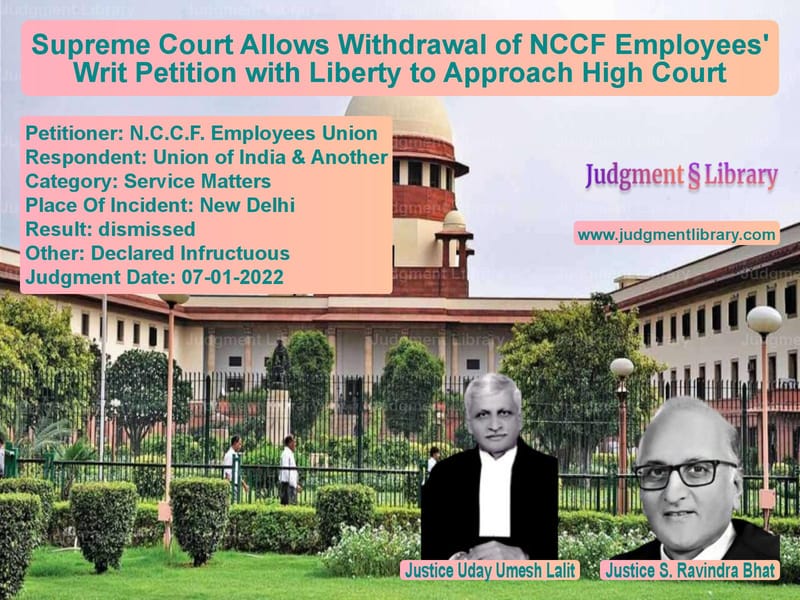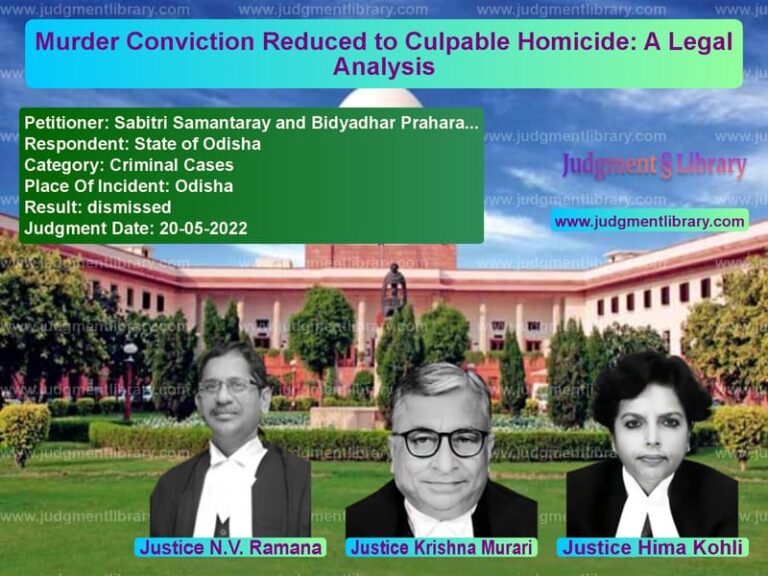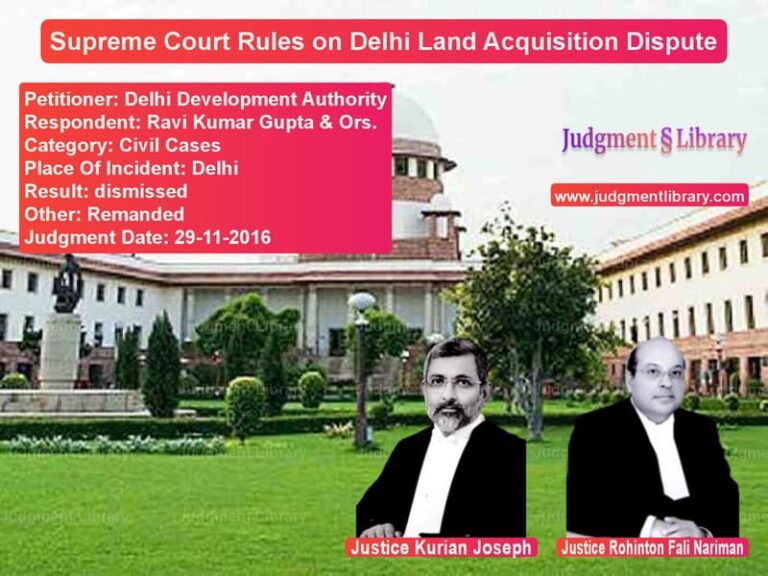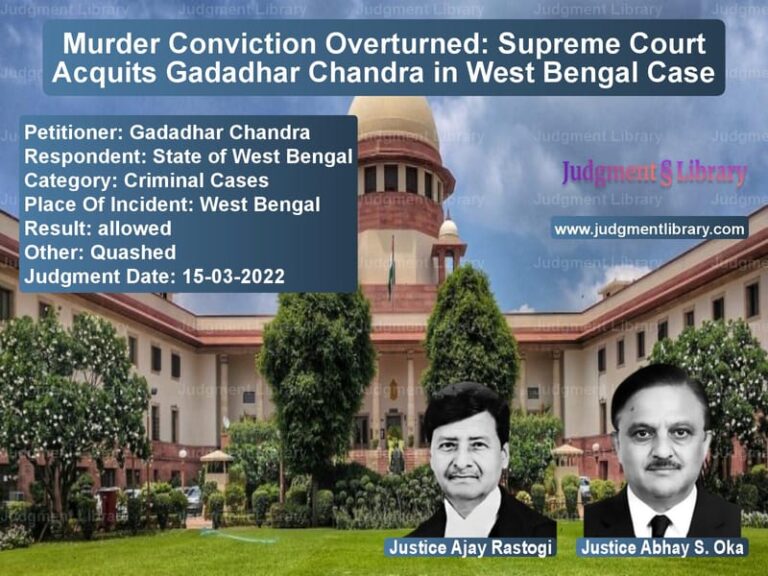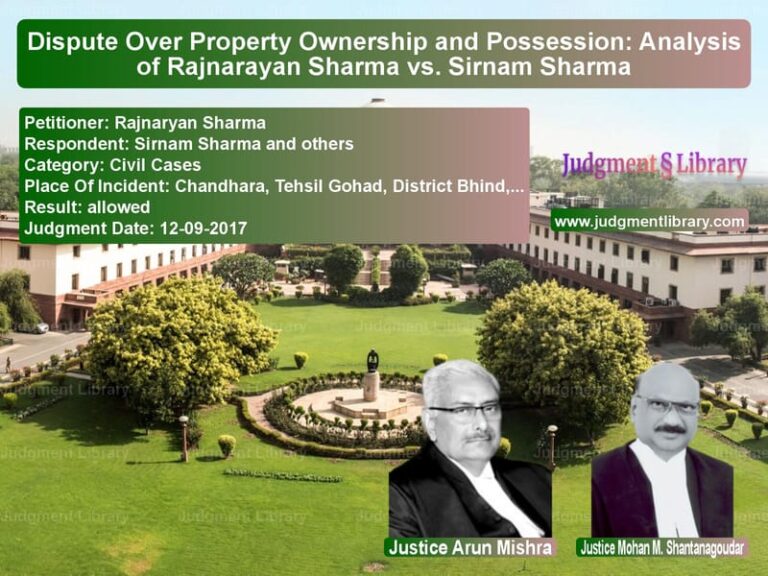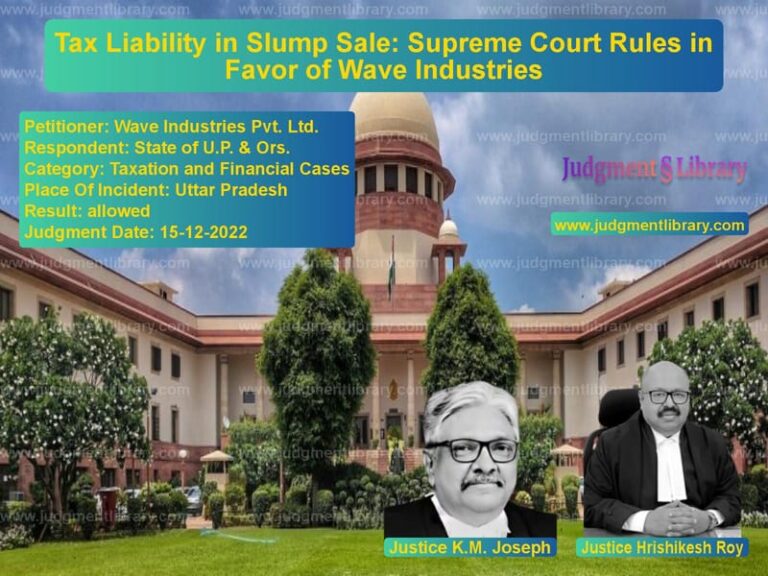Supreme Court Allows Withdrawal of NCCF Employees’ Writ Petition with Liberty to Approach High Court
The case of N.C.C.F. Employees Union vs. Union of India & Another is a significant ruling concerning the legal status of the National Co-operative Consumers’ Federation of India Limited (NCCF) and the rights of its employees to claim benefits. The Supreme Court allowed the petitioners to withdraw their writ petition with liberty to approach the High Court for relief, effectively setting aside the ongoing dispute over whether NCCF falls under the definition of ‘State’ under Article 12 of the Constitution of India.
Background of the Case
The petitioners, employees of the NCCF, filed a writ petition under Article 32 of the Constitution, seeking multiple financial and service-related benefits, including:
- 80% arrears/balance amount of the 6th Pay Commission.
- Arrears of dearness allowance from July 2015.
- Implementation of the 7th Pay Commission with arrears from January 1, 2016.
- Payment of leave encashment for the years 2015 and 2016.
- Upgradation and promotion of Class IV employees.
- Tea allowance and medical reimbursement for head office employees.
- Leave Travel Concession arrears since 2005.
- Retiral benefits and dues to retired employees.
The primary legal question before the Court was whether NCCF, a cooperative entity, qualifies as ‘State’ under Article 12 of the Constitution, making it amenable to writ jurisdiction.
Legal Issues Raised
- Whether NCCF is a ‘State’ under Article 12 of the Constitution and hence subject to writ jurisdiction.
- Whether employees of NCCF are entitled to pay commission benefits similar to other government employees.
- Whether conflicting judgments of different High Courts on NCCF’s status affect the employees’ rights.
Arguments of the Petitioners
The employees’ union, through legal counsel, presented the following arguments:
- Conflicting High Court Rulings: The Patna High Court ruled that NCCF is a ‘State’ under Article 12, whereas the Delhi High Court ruled otherwise.
- Legal Precedent Favors Petitioners: The Patna High Court’s judgment was upheld by a division bench, making NCCF answerable under writ jurisdiction.
- Withdrawal of Appeals by NCCF: NCCF had challenged the Patna High Court’s ruling in the Supreme Court but later withdrew its appeals, effectively accepting the verdict.
- Entitlement to Benefits: Since NCCF employees serve a public function, they should receive pay scales and benefits equivalent to government employees.
- Right to Seek Writ Jurisdiction: Given NCCF’s functions and government control, the employees argued they were entitled to seek remedies through the Supreme Court.
Arguments of the Respondents (Union of India & NCCF)
The Union of India, through the Additional Solicitor General, opposed the petition, arguing:
- NCCF Is Not a State Entity: The organization does not meet the constitutional requirements to be classified as ‘State’ under Article 12.
- Jurisdiction Issue: The petitioners should not have directly approached the Supreme Court under Article 32 but should have pursued their claims in the High Court.
- Financial Constraints: The financial obligations of NCCF differ from those of government agencies, making pay parity claims untenable.
Supreme Court’s Observations
The Supreme Court, led by Justices Uday Umesh Lalit and S. Ravindra Bhat, made the following key observations:
- Withdrawal of Appeals: Since NCCF withdrew its appeals against the Patna High Court’s ruling, the finding that NCCF is a ‘State’ under Article 12 remains unchallenged.
- Liberty to File in High Court: The Court granted the petitioners liberty to approach the High Court under Article 226 for relief.
- Limited Role of the Supreme Court in Service Matters: The Court emphasized that such service-related claims should first be addressed by the appropriate forums, such as service tribunals or High Courts.
Final Judgment
The Supreme Court disposed of the petitions with the following ruling:
“We allow the instant writ petition to be withdrawn, with liberty as prayed for by Mr. Dhingra. All the issues are left open to be decided in an appropriately instituted proceeding.”
Similarly, Writ Petition (Civil) No. 1221 of 2020 was also allowed to be withdrawn with liberty to approach the appropriate forum.
Implications of the Judgment
This ruling has several important implications:
- Recognition of NCCF as a State Entity: By withdrawing its appeal, NCCF effectively acknowledged its amenability to writ jurisdiction.
- Setting a Precedent for Similar Cases: Other cooperative organizations under government control may now be challenged in writ petitions for service-related claims.
- Service Matters Should Be Raised in High Courts: The ruling reinforces that employment and service-related grievances must first be raised in the appropriate forums before reaching the Supreme Court.
- Potential Policy Reforms: This case may lead to discussions on pay parity for employees in government-controlled cooperative institutions.
Conclusion
The Supreme Court’s decision in N.C.C.F. Employees Union vs. Union of India & Another reaffirms the procedural necessity for employees to seek relief through the High Courts before approaching the Supreme Court. The ruling also indirectly strengthens the claim that NCCF functions as a ‘State’ under Article 12, allowing future litigants to challenge the organization under writ jurisdiction. This decision upholds judicial discipline while granting employees a viable route to claim service-related benefits through the appropriate channels.
Petitioner Name: N.C.C.F. Employees Union.Respondent Name: Union of India & Another.Judgment By: Justice Uday Umesh Lalit, Justice S. Ravindra Bhat.Place Of Incident: New Delhi.Judgment Date: 07-01-2022.
Don’t miss out on the full details! Download the complete judgment in PDF format below and gain valuable insights instantly!
Download Judgment: n.c.c.f.-employees-u-vs-union-of-india-&-ano-supreme-court-of-india-judgment-dated-07-01-2022.pdf
Directly Download Judgment: Directly download this Judgment
See all petitions in Employment Disputes
See all petitions in Public Sector Employees
See all petitions in Pension and Gratuity
See all petitions in Judgment by Uday Umesh Lalit
See all petitions in Judgment by S Ravindra Bhat
See all petitions in dismissed
See all petitions in Declared Infructuous
See all petitions in supreme court of India judgments January 2022
See all petitions in 2022 judgments
See all posts in Service Matters Category
See all allowed petitions in Service Matters Category
See all Dismissed petitions in Service Matters Category
See all partially allowed petitions in Service Matters Category

